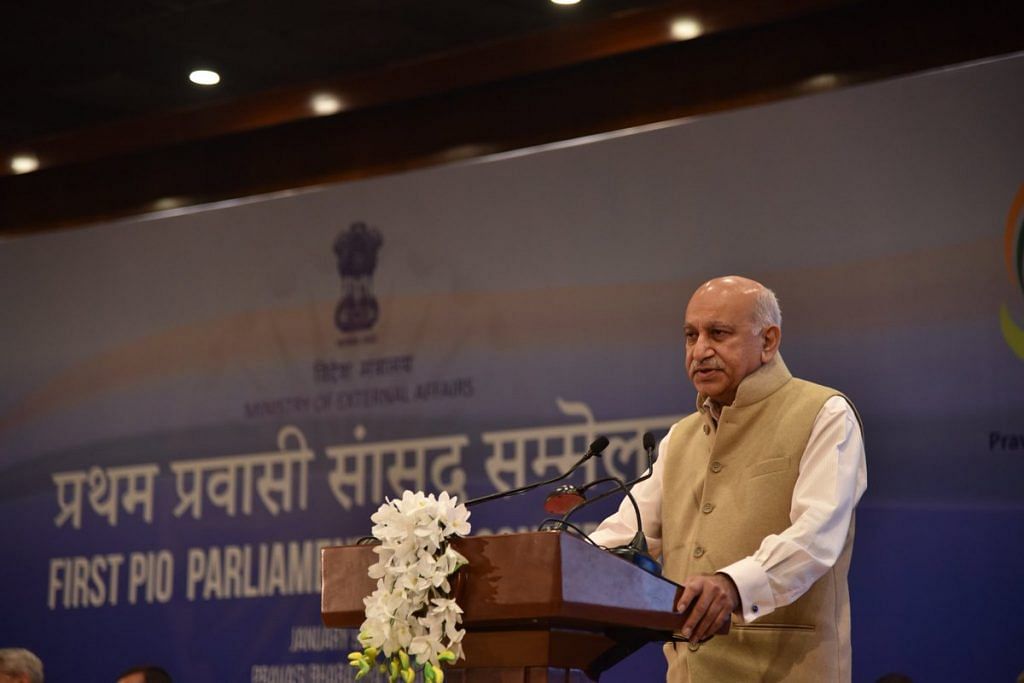We Indians want to solve every social problem with a legal remedy, but that is pointless and counterproductive. Naming and shaming is far more effective.
With M.J. Akbar filing for criminal defamation against Priya Ramani, it is possible that media attention on #MeToo may now shift to this case. And we should worry about it.
My worry is not that Priya Ramani or other women who called out Akbar would offer an Arvind Kejriwal-style apology. They have already demonstrated enough spunk and integrity. Nor do I worry about the long process or the uncertain outcome of the court proceedings. I rather look forward to some fun watching Akbar defend his “reputation” (it must be said that he has for many years enjoyed quite a reputation in this matter) and all evidence being laid out in public. I do not worry so much about this unequal (currently 97:1) legal battle — Priya Ramani versus M.J. Akbar could indeed become Ramani versus The Union of India or Women versus Predators of India. David versus Goliath is a morally energising battle, irrespective of its outcome.
I have a small worry and a big worry. The small worry is that this ‘legal turn’ can deter others and it can distract from the main focus. My big worry is that this can displace the principal site of this struggle from public reason to law.
Also read: Tarun Tejpal’s gaming of legal system shows why #MeToo doesn’t believe in due process
Clearly, the point of this defamation case is to provide a fig leaf for Akbar to continue in his office. The second objective is to deter more women from calling Akbar out, and to deter the media from calling out other predators. The case may not see an end, but before it is dropped quietly, it may have served to put out the wildfire of #MeToo.
The focus on M.J. Akbar could turn out to be a distraction. A case involving a minister caught on the eve of the elections cannot but lend itself to a political campaign. That, indeed, is what Akbar would like. As Akbar becomes a good stick to beat the BJP with, we may forget that it was the Congress that gave this predator his first political break and legitimacy in political circles. Involvement in an electoral slugfest could conflate the fight against patriarchy with a fight against the Modi regime.
My real worry about this legal turn is something else. I fear that over attention on this case could displace the principal site of public morality to courts of law. Should that happen, we stand to lose one of the principal gains of the #MeToo movement, namely the creation of a public space where right and wrong could be deliberated using public reasoning.
This is critical. Every wrong is not a violation of law, and every violation of law cannot be proven in a court. This is not just about sexual harassment. A politician who goes back on his promises, a teacher who has no time for students, a doctor who over-medicates, or a lawyer who callously neglect his clients — all this needs to be called out, but the law is not the right instrument to correct these wrongs. Each of these offenders need to be checked, warned and exposed, but none of them need to be in jail. Public scrutiny and collective ‘truthcovery’ is the only remedy here.
Also read: I regret filing a ‘due process’ complaint, says a sexual harassment victim watching #MeToo
The law has to address the lowest standards of acceptable behaviour and demand the highest standards of proof. The law steps in only when unacceptable behaviour crosses all boundaries and enters the domain of criminality. A good deal of sexual harassment and various other forms of misconduct do not fall in this category.
More importantly, legal action requires watertight proof, beyond any reasonable doubt, plus a very cumbersome procedure. I doubt if more than one or two of the cases in #MeToo can result in conviction by courts. But naming and shaming is likely to be far more effective.
That is why we need other forms of public trial. The real achievement of #MeToo so far has been the promise of such a public space. Public airing of traumatic experience, public solidarity with sufferers, calling out serial offenders, apologies and resignations — all this is vital to cleansing our public culture. This has begun to show results. Media organisations have suddenly discovered their Internal Complaints Committees. Suspected offenders are being sent on leave. It is embarrassing to keep silent about this issue.
At the same time, #MeToo has shown the possibility of an alternative protocol of ‘truthcovery’. Anonymous allegations are not being entertained. Each act of naming is accompanied by a thick description, some corroboration and evidence. Yes, pain is admitted as testimony, but this is not just emotional venting. There is space for the accused to respond and indeed some of the irresponsible charges have been filtered out. #MeToo has not degenerated into a kangaroo court of male bashing.
Also read: Long before India’s #MeToo, Pati Patni Aur Woh thought workplace harassment was funny
We Indians want to solve every social problem with a legal remedy. More often than not, it is pointless, if not counterproductive. If we want to take forward this rare opportunity in our public life, let us not think of the court of law as the final arbiter of these public debates on sexual harassment. Public naming, shaming and taming is what #MeToo is all about.
This article was written before M.J. Akbar’s resignation.
Yogendra Yadav is National President of the newly-formed party, Swaraj India.
Catch ThePrint’s in-depth, extensive coverage of the #MeToo movement in India here
